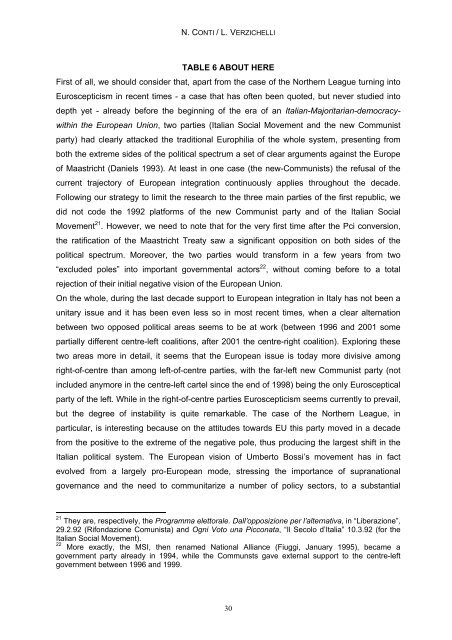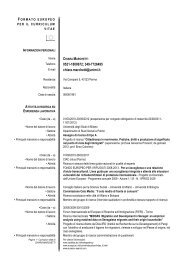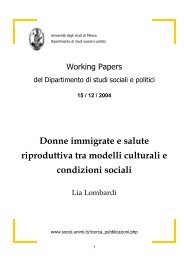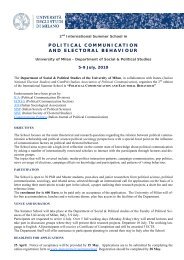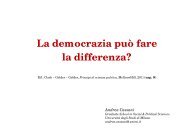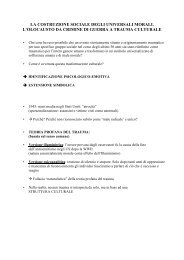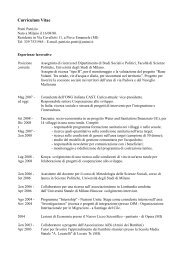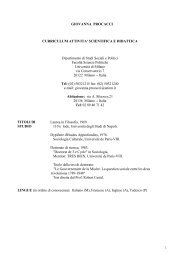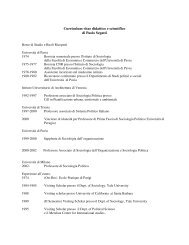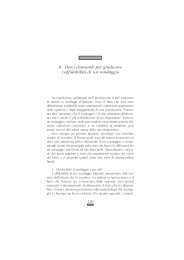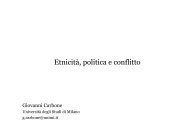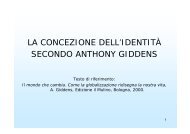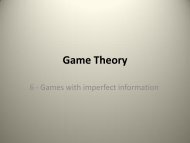The european dimension of political discourse in Italy. A ... - CIRCaP
The european dimension of political discourse in Italy. A ... - CIRCaP
The european dimension of political discourse in Italy. A ... - CIRCaP
Create successful ePaper yourself
Turn your PDF publications into a flip-book with our unique Google optimized e-Paper software.
N. CONTI / L. VERZICHELLI<br />
TABLE 6 ABOUT HERE<br />
First <strong>of</strong> all, we should consider that, apart from the case <strong>of</strong> the Northern League turn<strong>in</strong>g <strong>in</strong>to<br />
Euroscepticism <strong>in</strong> recent times - a case that has <strong>of</strong>ten been quoted, but never studied <strong>in</strong>to<br />
depth yet - already before the beg<strong>in</strong>n<strong>in</strong>g <strong>of</strong> the era <strong>of</strong> an Italian-Majoritarian-democracywith<strong>in</strong><br />
the European Union, two parties (Italian Social Movement and the new Communist<br />
party) had clearly attacked the traditional Europhilia <strong>of</strong> the whole system, present<strong>in</strong>g from<br />
both the extreme sides <strong>of</strong> the <strong>political</strong> spectrum a set <strong>of</strong> clear arguments aga<strong>in</strong>st the Europe<br />
<strong>of</strong> Maastricht (Daniels 1993). At least <strong>in</strong> one case (the new-Communists) the refusal <strong>of</strong> the<br />
current trajectory <strong>of</strong> European <strong>in</strong>tegration cont<strong>in</strong>uously applies throughout the decade.<br />
Follow<strong>in</strong>g our strategy to limit the research to the three ma<strong>in</strong> parties <strong>of</strong> the first republic, we<br />
did not code the 1992 platforms <strong>of</strong> the new Communist party and <strong>of</strong> the Italian Social<br />
Movement 21 . However, we need to note that for the very first time after the Pci conversion,<br />
the ratification <strong>of</strong> the Maastricht Treaty saw a significant opposition on both sides <strong>of</strong> the<br />
<strong>political</strong> spectrum. Moreover, the two parties would transform <strong>in</strong> a few years from two<br />
“excluded poles” <strong>in</strong>to important governmental actors 22 , without com<strong>in</strong>g before to a total<br />
rejection <strong>of</strong> their <strong>in</strong>itial negative vision <strong>of</strong> the European Union.<br />
On the whole, dur<strong>in</strong>g the last decade support to European <strong>in</strong>tegration <strong>in</strong> <strong>Italy</strong> has not been a<br />
unitary issue and it has been even less so <strong>in</strong> most recent times, when a clear alternation<br />
between two opposed <strong>political</strong> areas seems to be at work (between 1996 and 2001 some<br />
partially different centre-left coalitions, after 2001 the centre-right coalition). Explor<strong>in</strong>g these<br />
two areas more <strong>in</strong> detail, it seems that the European issue is today more divisive among<br />
right-<strong>of</strong>-centre than among left-<strong>of</strong>-centre parties, with the far-left new Communist party (not<br />
<strong>in</strong>cluded anymore <strong>in</strong> the centre-left cartel s<strong>in</strong>ce the end <strong>of</strong> 1998) be<strong>in</strong>g the only Eurosceptical<br />
party <strong>of</strong> the left. While <strong>in</strong> the right-<strong>of</strong>-centre parties Euroscepticism seems currently to prevail,<br />
but the degree <strong>of</strong> <strong>in</strong>stability is quite remarkable. <strong>The</strong> case <strong>of</strong> the Northern League, <strong>in</strong><br />
particular, is <strong>in</strong>terest<strong>in</strong>g because on the attitudes towards EU this party moved <strong>in</strong> a decade<br />
from the positive to the extreme <strong>of</strong> the negative pole, thus produc<strong>in</strong>g the largest shift <strong>in</strong> the<br />
Italian <strong>political</strong> system. <strong>The</strong> European vision <strong>of</strong> Umberto Bossi’s movement has <strong>in</strong> fact<br />
evolved from a largely pro-European mode, stress<strong>in</strong>g the importance <strong>of</strong> supranational<br />
governance and the need to communitarize a number <strong>of</strong> policy sectors, to a substantial<br />
21 <strong>The</strong>y are, respectively, the Programma elettorale. Dall’opposizione per l’alternativa, <strong>in</strong> “Liberazione”,<br />
29.2.92 (Rifondazione Comunista) and Ogni Voto una Picconata, “Il Secolo d’Italia” 10.3.92 (for the<br />
Italian Social Movement).<br />
22 More exactly, the MSI, then renamed National Alliance (Fiuggi, January 1995), became a<br />
government party already <strong>in</strong> 1994, while the Communsts gave external support to the centre-left<br />
government between 1996 and 1999.<br />
30


